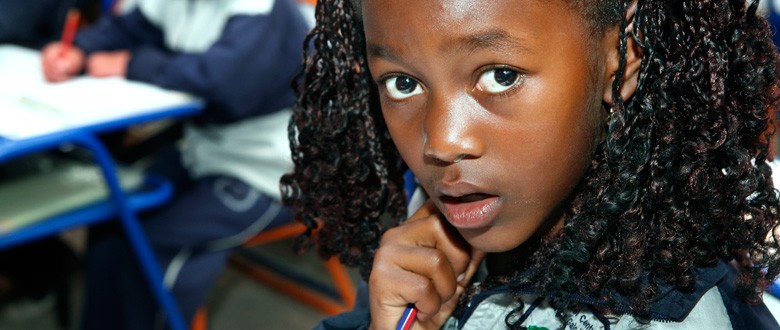
Since the inauguration of the Correa government in January 2007, investments in the social sector are top priority, and education has received the most attention with 55% of the budget (€1621 million). This results in an excellent conjecture for VVOB’s development cooperation. All the more because the aid that is given, mostly contains technical assistance, which, in this case, can count on investments for a proper framework of its cooperation activities.
After decades of neglect, The Ministry of Education arises now like a phoenix from its ashes and reclaims the full leadership of the education sector. However, this process does not enfold without striking a blow here and there as it entails a speedy process of change with a fair amount of major reshuffles, nationally as well as regionally and locally. Even the support that is given to a large part of the local poor population is the cause of much resistance in other parties.
Schools as Actors of Change in full expansion
The programme ‘Schools as Actors of Change’ (Escuelas Gestoras del Cambio - EGC) aids the Ministry of Education in the realisation of its ten-year plan (2006-2015). Amongst others, it improves the pre-service training and the in-service tutoring of primary education teachers. In addition, the programme helps with the modernisation of the inspection service. A small part is dedicated to practical research to help the education policy to involve parents in the schools. ‘Learning’ is important in this programme. This process is being recorded with our partners in a series of jointly published publications.
Environmental research as dynamic starting point
The programme kicked of in 2008 with an extensive environmental research in ten selected provinces. The aim was to be able to make a decent choice of schools and to activate the cooperation of all parties involved. This was done by means of a participative research whereby involving the new interdisciplinary work groups of the board of education in the respective provinces. In 2009 this will be finished.
The research has identified 82 learning communities. They are comprised of 2095 teachers, 56,926 students and 486 schools. 82 of these schools have a specific valuable pedagogical experience (e.g. in the field of environmental education, mathematics and language education, parent involvement,…).
Increased participant involvement
As operations progress in the provinces and on the central level, the partners’ involvement grows. The participative approach explains the participants’ enthusiasm and the target groups’ high expectations. The Ministry has known VVOB for many years and is able to value its technical support. This feeling of mutual trust considerably simplifies and strengthens the existing cooperation.
The 82 selected schools have already been through an intense reflection process. It enables them to strengthen their experiences and to spread them to the surrounding schools. The VVOB team and its colleagues of the Ministry lead the provincial participants.
End-phase projects
The project PLANTELplus is situated within the sector of spatial planning. Its main benefactor of support is SENPLADES (the National Secretariat for Planning and Development) and it also has agreements with AME (municipalities) and CONCOPE (provinces). On the one hand, this cooperation focuses on technical support and capacity development of the partners to make democratic and efficient use of the territory; on the other hand, it helps with the draft of a national planning system that should provide more clarity regarding the competences of the three government levels. This project will end in June 2010.
Challenges for 2010
2010 will bring a greater commitment of technical support on a local level. All schools and communities will be closely involved in different in-service training activities, which will strengthen the process of change through the participants. The target remains to increase the quality of education.
From the central level, courses will be organised to train all teachers and principals. Afterwards, the programme will help them to put their newly acquired knowledge into practise.
The schools will be better organised because of the development of their ‘institutional education project’. This project lays out the course the institution will follow in the coming years. Students as well as teachers, principals and parents will cooperate and all students and parents can contribute to environmental actions.




